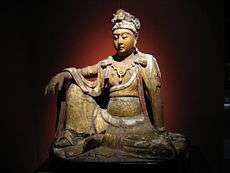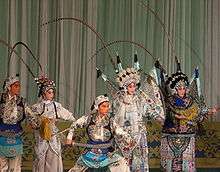Chinaknowledge
Type of site | Informational / Hobbyist |
|---|---|
| Owner | Dr. Ulrich Theobald |
| Created by | Dr. Ulrich Theobald |
| Website | http://www.chinaknowledge.de/ |
| Commercial | non-commercial |
| Launched | 2001 |
Chinaknowledge, with the subtitle "a universal guide for China studies", is an English-language hobbyist's web site that contains a wide variety of information on China and Chinese topics. The site was founded by and is maintained by Ulrich Theobald, a Lecturer for Chinese History and Classical Chinese at the University of Tübingen, where he received his doctorate in Chinese Studies in 2009.[1]
The site is frequently used as a citation source for facts presented elsewhere since it is not commercial and site's author states all his sites are freely visible and copyable. However, the site's author states, "When writing papers, students should use books and not the internet."[2]
Chinaknowledge.de provides information about Chinese history and culture to a wide public, from academicians and high-school pupils to the interested "layman".[3] Chinaknowledge concentrates on certain aspects insufficiently dealt with by other sources, especially traditional literature, biographies, historical terms, economic history.[3]
The author identifies Chinaknowledge as a non-commercial endeavor and pledges that he will "not make any advertisements for profit-oriented companies on my site."[2]
Topics
Chinese Art
Architecture




- Palaces
- Fortifications
- The Great Wall
- Monasteries and Pagodas
- Tombs
- Temples
- Gardens
- Houses
- Streets
- Bridges
- Cities and Villages
Handicraft
- Ritual Bronze Vessels
- Gold and Silver
- Other Metal Items
- Jade and Other Stones
- Bamboo
- Wood (except furniture)
- Paper, Ivory and Bone
- Leather and Horn
- Lacquerware
- Earthen and Stone Ware
- Chinaware
- Enamel
- Cloisonné
- Glass
Plastic and Graphic Art
- Temple Sculpture
- Earthenware Sculpture
- Buddhist Grotto Sculpture
- Stone Carvings (except calligraphy)
- Brick Stone Reliefs
- Calligraphy, Printing
- Painting
- Mural Painting
- Contemporary Art
Living
- Furniture
- Silk and Clothing
- Finery and Adornments
- Minority Fashion
- Silk Painting and Embroidery
- Folk Art, Money
- Coins and Bills
- Seals
- Treasures of the Study
- Weapons
Performing Arts
- Theatre and Opera
- Music
- Dance
Chinese Literature
The word "literature" has two meanings. In a narrower sense it means belles-lettres, writings done with a purpose of entertainment, leisure, self-expression, and so on, like poems, novels, letters, or diaries. In a broader sense, like it is treated here, "literature" means everything that has been written, including philosophical writings, scientific treatises, political writings, geography, inscriptions on tomb stones, or documents of court politics.[4]
Chinaknowledge provides four different search tools to readers:
- Literature from A to Z
- Literature by time, Literature by theme
- Literature by the four categories
- Terms in Chinese literature
Chinese History
This section of the Chinaknowledge Encyclopedia deals with Chinese history from the beginnings to the People's Republic of China. It is organised in the traditional, and still common, way of regarding Chinese history from the viewpoint of dynasties. Each dynasty or dynastic period is explained in terms of event history, the history of administration and government, economic history, the history of philosophy and literature during the respective periods, religion, technology and inventions, as well as the history of arts. Literature, philosophy, arts and religions in general are described in detail in the respective parts of this encyclopedia. For each historical period, detailed information is given about the rulers and the geography of their realm.[5]
Special indexes and articles are provided for the following themes:
- Calendar and Chronology
- Titles of Rulers and Names of Persons
- Eminent; Persons in Chinese history
- Terms in Chinese History
- Examination System
- Foreign Peoples in and around China
Chinese Music
Music Instruments:
- Bamboo instruments
- Wooden instruments
- Silk instruments
- Earthen instruments
- Metal instruments
- Stone instruments
- Leather instruments
- Gourd instruments
Chinese Religions
The Three Doctrines:
The "Persian" religions ("Three foreign religions"):
others:
- Local Deities
- Muslims in China
- Christians in China
- The Heavenly Kingdom of Hong Xiuquan
- Jews in China
Chinese Language and Chinese Characters
With 1.5 billion speakers, the Chinese language is the most spoken language of the world. It is nevertheless one single language that is spoken in the same form in all parts of China, nor has it been unchanged over time. The script by which the Chinese language is written is an ideographic script embedded into clouds of mystery. It is an obstacle for education and literacy and has nevertheless been used for a vast treasury of literature. And it has provided an example for the scripts of neighbouring states. This part of the encyclopedia provides an introduction into important aspects of both the Chinese language and the Chinese script.[6]
Chinese Language
- Classical Chinese (wenyan 文言)
- Topolects ("Dialects")
- The Guangyun 廣韻 rhyme system
- The she 攝 rhymes
- The fanqie 反切 system
- The qieyin 切音 transcription systems
- The Ladingxua sin wenz 拉丁化新文字 transcription system
- The Gwoyeu Romatzyh 國語羅馬字 transcription system
- The Zhuyin 注音字母 transcription system (Bo-po-mo-fo)
- The Hanyu pinyin 漢語拼音 transcription system
- The Wade–Giles transcription system
Chinese Script (Characters)
- Character simplification
- Calligraphy
- The radical systems
- The sijiao haoma 四角號碼 "four corners" system
- Lin Yutang's two corners instant index system 上下形檢字法
- Liu Dah-ren's left-top speedy radical system 左上文快檢部首
- The Harvard-Yenching index system
- The Changjei 倉頡 system
- Computer codification and input systems
Derivates of the Chinese script
- The Khitan script
- The Jurchen script
- The Tangut script
- Japanese Kanji
- Japanese Kana
- The Vietnamese Chu Nom script
Other scripts used in China
- The Turkic script (Orkhon script)
- The 'Phags-pa script
- The Manchu script
- The Nü shu "women's script"
References
- ↑ Ulrich, Theobald (2013). "About the Author". War Finance and Logistics in Late Imperial China: A Study of the Second Jinchuan Campaign (1771-1776). Monies, markets, and finance in East Asia, 1600-1900. Leiden: Brill. doi:10.1163/9789004255678. ISBN 9789004255678. ISSN 2210-2876.
- 1 2 Ulrich Theobald. "Chinaknowledge - About us". Chinaknowledge. Retrieved 2010-06-05.
- 1 2 Ulrich Theobald. "Chinaknowledge - home". Chinaknowledge. Retrieved 2012-11-23.
- ↑ Ulrich Theobald. "Chinaknowledge - Chinese Literature". Chinaknowledge. Retrieved 2012-11-23.
- ↑ Ulrich Theobald. "Chinaknowledge - Chinese History". Chinaknowledge. Retrieved 2012-11-23.
- ↑ Ulrich Theobald. "Chinaknowledge - Chinese Language and Script". Chinaknowledge. Retrieved 2012-11-23.